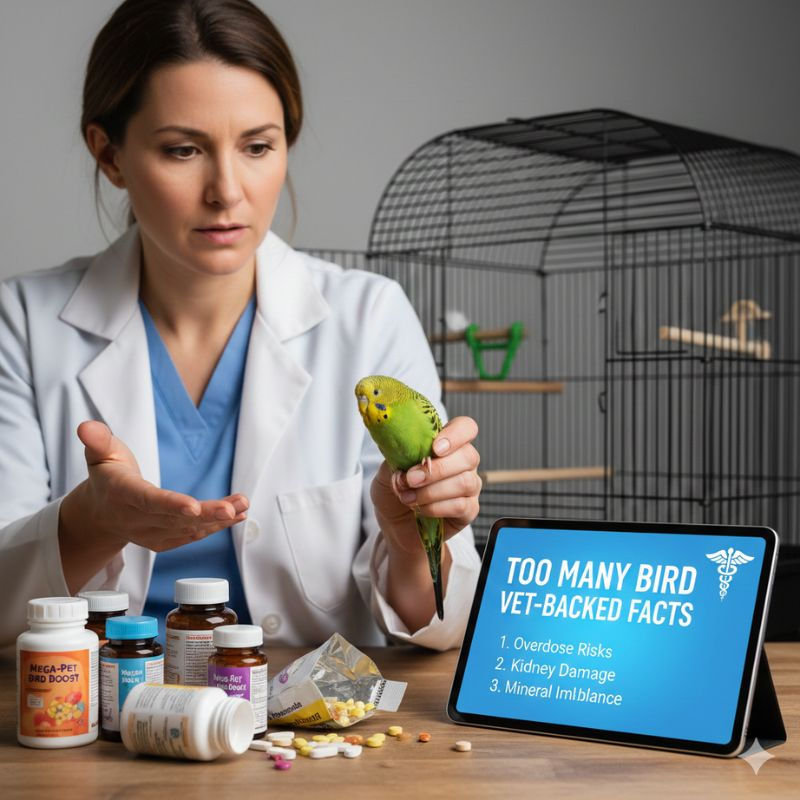Reptile Vitamins & Supplements: Myths You Need to Stop Believing
- petperchlove
- Apr 30, 2025
- 4 min read

Proper reptile care goes far beyond habitat setup and feeding schedules. While many pet owners do their best to provide a balanced diet, reptile vitamins and reptile supplements often remain misunderstood or misused. Some people even avoid them altogether due to circulating myths.
In this article, we’ll break down the most common misconceptions about reptile nutrition, offer expert-backed information, and help you understand when and how to use reptile supplements effectively. Whether you’re a new reptile owner or an experienced herpetologist, this guide will help ensure your scaled friend thrives.
Why Reptile Vitamins Matter More Than You Think
Reptiles, unlike mammals, have very specific and delicate nutritional needs. In the wild, they get a variety of minerals and vitamins from diverse food sources, sunlight, and natural substrates. However, in captivity, these elements are often missing or insufficient.
That's where reptile vitamins come into play. These essential nutrients support immune function, bone health, reproduction, and skin shedding. Without proper supplementation, reptiles can suffer from conditions like:
Metabolic bone disease
Vitamin A deficiency
Weak immune response
Poor skin health
Top Myths About Reptile Supplements—Debunked
Let’s dive into the most common myths and separate fact from fiction.
Myth 1: Reptiles Don’t Need Supplements if They Eat Well
Truth: Even if you provide a variety of insects, leafy greens, or fruits, it’s nearly impossible to recreate the nutrient diversity of a reptile’s wild diet. Most feeder insects are deficient in calcium and vitamins A and D3. Reptile supplements are essential to fill in these nutritional gaps.
Myth 2: All Reptile Vitamins Are the Same
Truth: Different reptiles have different needs. For example, bearded dragons and chameleons require more calcium and D3 compared to leopard geckos. Some species might even need reptile medication if they suffer from malabsorption or other health conditions.
It’s crucial to choose supplements designed for your specific reptile. Retailers like Kwik Pets offer species-specific formulations that are tailored to various reptilian needs.
Myth 3: UVB Lighting Replaces the Need for Vitamin D3 Supplements
Truth: While UVB exposure helps reptiles synthesize vitamin D3, indoor lighting often falls short. The strength of UVB decreases with distance, age of the bulb, and enclosure setup. A balanced approach using UVB and D3-enriched supplements is usually the safest choice.
Myth 4: More Supplements = Better Health
Truth: Over-supplementation can be just as dangerous as deficiency. High doses of fat-soluble vitamins like A and D3 can cause toxicity. Always follow dosage instructions and consult a vet before combining multiple reptile vitamins.
Myth 5: You Only Need Supplements During Illness
Truth: Vitamins and minerals are not just for treating illness—they're key to prevention. Regular use of appropriate reptile supplements helps your pet stay resilient against common health problems, reducing the need for frequent reptile medication.
Where to Buy Quality Reptile Supplements
It’s important to source your vitamins and supplements from reputable retailers. Kwik Pets offers a wide selection of trusted brands, including calcium powders, multivitamins, and D3 sprays suitable for lizards, snakes, turtles, and more. Their customer support and fast shipping make them a go-to choice for responsible pet owners.
When to Use Reptile Medication Instead of Supplements
Supplements are preventive, while reptile medication is corrective. If your reptile shows signs of illness like lethargy, poor appetite, or deformities, it’s time to consult a reptile vet. Medication may be necessary to correct severe imbalances or infections.
Never substitute vitamins for veterinary treatment if your pet shows signs of distress.
Expert Tips for Using Reptile Vitamins Safely
Dust feeder insects with a supplement powder before feeding.
Alternate calcium and multivitamins throughout the week.
Monitor UVB exposure and replace bulbs every 6-12 months.
Store supplements properly—cool, dry places preserve potency.
Consult your vet about proper dosage and frequency.
Final Thoughts
Using reptile vitamins and reptile supplements isn’t about going overboard—it's about smart, responsible care. By dispelling the myths and understanding their true value, you give your reptile the best shot at a long, healthy life.
Don't fall into the trap of misinformation. Instead, rely on trusted platforms like Kwik Pets to get high-quality products that are right for your pet’s needs. When used correctly, these supplements are not optional—they're essential.
FAQs About Reptile Vitamins & Supplements
Q1: How often should I give reptile vitamins to my pet?
A: It depends on the species, age, and diet of your reptile. Generally, calcium can be given 3–4 times a week and multivitamins once a week, but always consult a vet for precise guidance.
Q2: Can I use human vitamins for my reptile?
A: No. Human vitamins are not formulated for reptiles and can lead to overdose or nutritional imbalances. Always use products specifically designed for reptiles.
Q3: What’s the difference between reptile vitamins and reptile medication?
A: Vitamins are preventive supplements to support health, while medication treats specific health issues like parasites or infections. Never self-medicate your reptile—see a vet first.
Q4: Do reptiles still need vitamins if they’re on a commercial diet?
A: Most commercial diets are balanced, but depending on the species, additional supplementation might still be required. A vet can help you assess if any gaps exist.
Q5: Where can I buy trusted reptile supplements online?
A: Kwik Pets is a reliable online store offering a wide variety of reptile care products, including high-quality vitamins, supplements, and accessories.



Comments